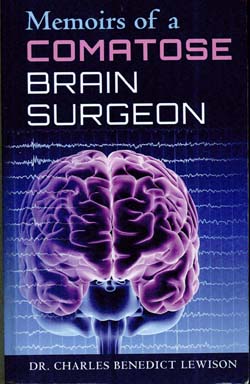Memoirs of a Comatose Brain Surgeon by Dr. Charles Benedict Lewison; © 2013, ISBN 978-148-4880-272; 605 pages
By Donald H. Harrison

 SAN DIEGO—My wife Nancy likes police detective shows and hospital dramas. In the latter category, I can remember sitting with her watching episode after episode of Dr. Kildare, Ben Casey, ER, Macus Welby MD, Chicago Hope, Grey’s Anatomy, Royal Pains, and Night Shift. So in reading Memoirs of a Comotose Brain Surgeon, I recognized that this episodic book easily could be adapted for television, and perhaps that is what Dr. Lewison had in mind when he wrote its 95 chapters, including the epilogue.
SAN DIEGO—My wife Nancy likes police detective shows and hospital dramas. In the latter category, I can remember sitting with her watching episode after episode of Dr. Kildare, Ben Casey, ER, Macus Welby MD, Chicago Hope, Grey’s Anatomy, Royal Pains, and Night Shift. So in reading Memoirs of a Comotose Brain Surgeon, I recognized that this episodic book easily could be adapted for television, and perhaps that is what Dr. Lewison had in mind when he wrote its 95 chapters, including the epilogue.
It’s easy to knock off a few chapters a time in a single sitting, all the while coming to appreciate what a difficult life surgical residents lead, particularly those who go on to become neuro-surgeons. They not only have to learn the structure of the brain, the functions of its different parts, and intricate techniques for removing tumors, but they apparently have to do this while sleep deprived and while dealing with egotistical and power-hungry “teachers” who fear anyone whose skills might surpass their own.
The incredibly long hours, the stress, and the close proximity within which surgeons and their colleagues and staffs work together —sharing the elation of successful surgeries and the depression of those gone wrong – also can lead to bonding, which in turn can lead to sexual intimacy. As one might imagine, this can play havoc with marriages when the spouse works and lives outside the hospital setting.
Dr. Lewison explores the many relationships one might find among a hospital’s medical staff, thereby bringing into focus how personality clashes might adversely influence patient care. In other chapters, he helps us to appreciate the miraculous nature of medicine, and how with deft strokes a surgeon might restore a seemingly hopeless patient once again to health.
The vehicle Lewison utilizes in this novel is a flashback story in which Dr. Jake Leiberman, unable to move or to talk after being shot at the onset of the book, remembers the early stages of his career while lying in a hospital bed. Leiberman is Jewish, and there are occasional religious references in this novel, but for the most part its story is universal. One subplot that I wish had been more fully developed was Leiberman’s friendship with a Muslim doctor from Kuwait. Unfortunately, whatever religious and political differences they might have had—and how they were bridged—was never discussed.
Next time before I check into a hospital for any reason, I think I’ll inquire about how members of the medical staff get along.
*
Harrison is editor of San Diego Jewish World. Your signed comment may be posted in the space provided below or sent to donald.harrison@sdjewishworld.com